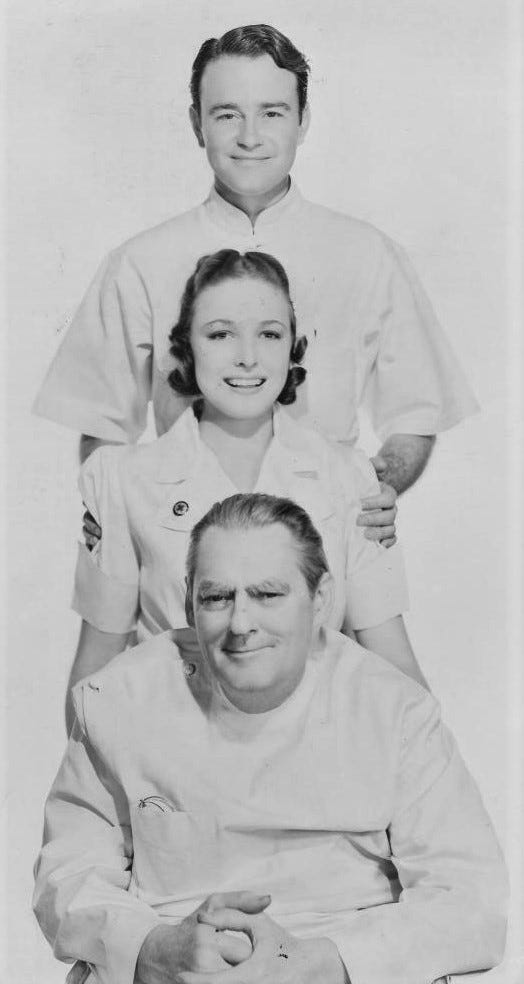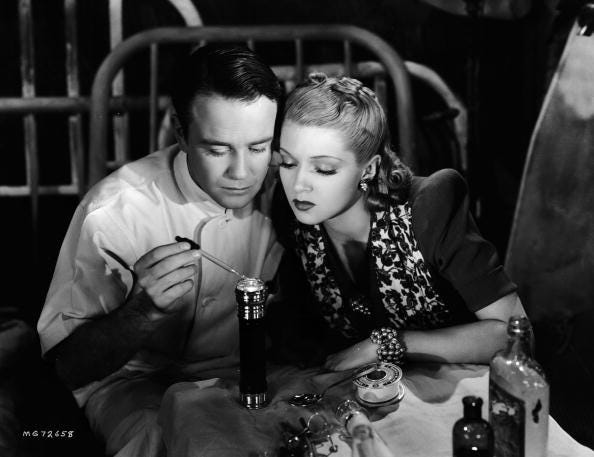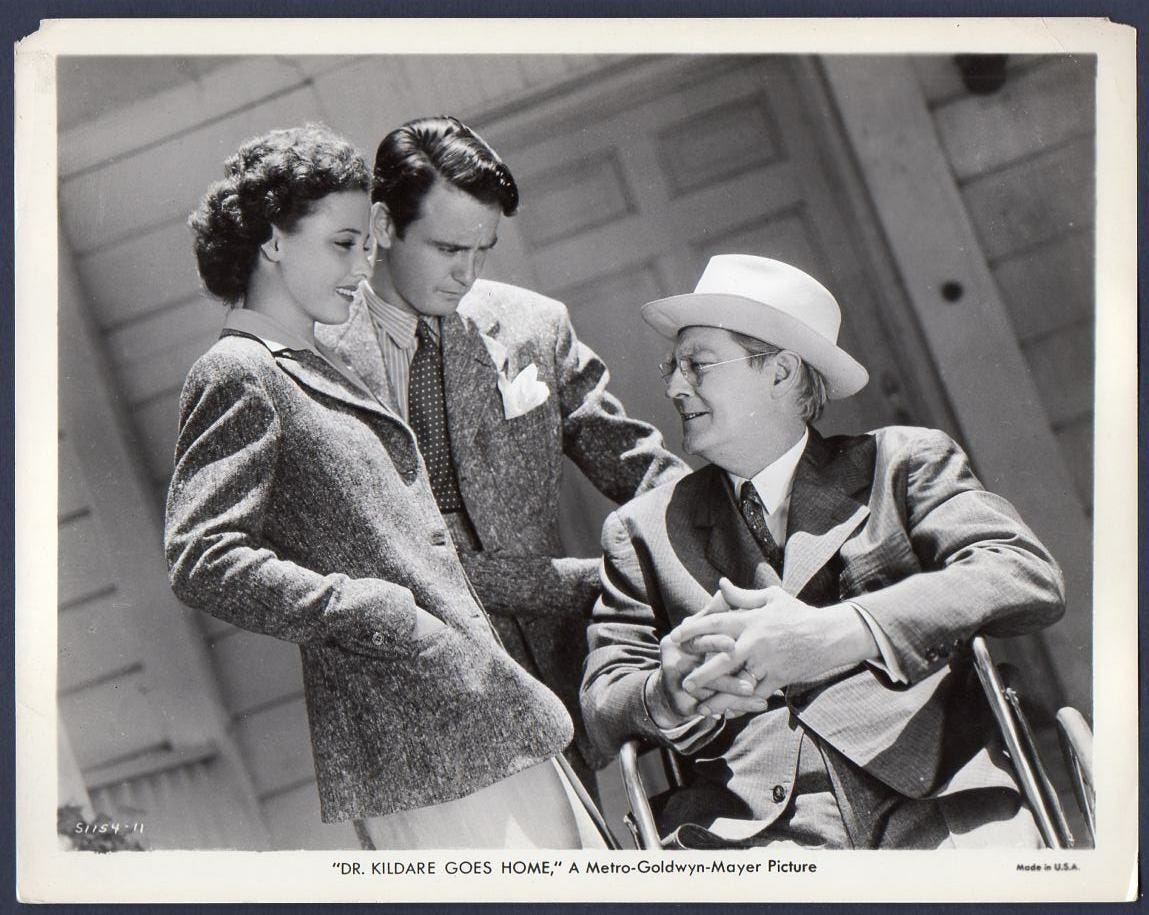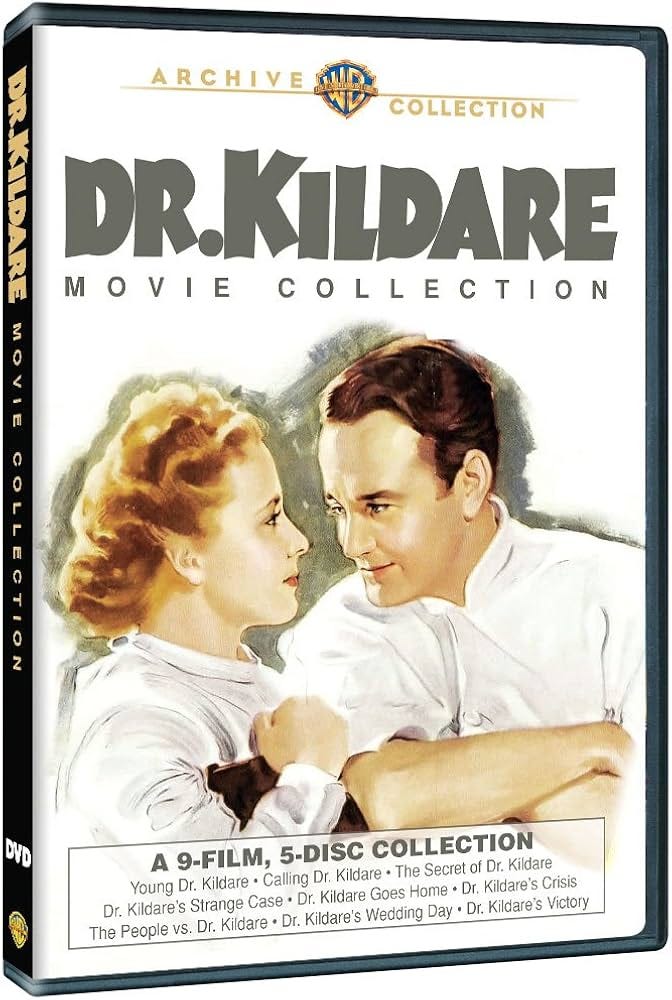In Which Young Dr Kildare is Calling His Secret a Strange Case, Goes Home, Has a Crisis Versus People, and has a Wedding Day Victory
The MGM Dr Kildare Series (1938-1942)
Dr Kildare is the child of author Max Brand, the pseudonym’d Frederick Faust, which was a collection of short stories first serialized in magazines in the 1930s. As it stands, the stories are in a weird spot since the text itself is public domain, but if they are printed by a publisher, the books themselves are not. A very strange technicality, but it comments on the minefield state of the printed word these days, as the Internet Archive has all too long suffered its wrath. They can be read for free here.
The Kildare series follows a young, idealistic doctor, also a virtuoso at the profession. It progresses through his internship and full fledged Doctor-dom at Blair General, a large city hospital, where he collides with the realities of the modern world. Through the tutelage of a mentor, created for the MGM series by Brand to fit the new format, Dr Gillespie (Lionel Barrymore), he learns there’s much more to being a doctor than diagnosing and surgery.
In the first half of the 20th century, movie studios were craving for serialized print properties that could be turned into lucrative, serialized and syndicated moving images. These were often revenue piñatas on their own, for the express purposes of feeding a studio’s proper A-grade pictures, but it was a good testing ground for young actors and an exercise mat for older, more established ones, not to mention it kept people on contract, both technicians and actors, busy.
Many of us are familiar with adaptations of all sorts of classic and miscellaneous literature making it to the screen: novels, novellas, plays, pulpies, comics and so on. In film’s earliest days, besides the fact it was prefab-matter to transform into the new format, it was an attempt at legitimizing film for the intellectual upper crust or otherwise highbrow folks, lest we forget that Movies by reputation were beneath live theater, which was also considered detestable. Of course, it was also material the production teams sometimes didn’t have to purchase as many resources for, only the rights where it applied. It still required adaptation, which is an art of its own. Adaptation of well-known works is relatively less expensive, guaranteed an audience, and was much faster than hiring writers to devise original stories and scripts, for time and money.
It is astounding how many eventually turned into multi-movie franchises, a term that wasn’t available back in the day, but nevertheless they were. Dr Kildare was one of them. The character was first attempted by Paramount, which made the first Kildare short story, Internes Can’t Take Money. It starred Joel McCrea and Barbara Stanwyck, and was directed by Alfred Santell. The movie didn’t do so hot at the box-office, so a disenchanted Paramount lost interest, blind to any potential with a medical-centric drama.
Louis B. Mayer at MGM thought otherwise and picked it up. Seeing opportunity, he drew on actor Lew Ayres, a popular actor who had made his star in Lewis Milestone’s 1930 stalwart anti-war drama All Quiet on the Western Front. He was fresh off of George Cukor’s hit Holiday, was still on the up and up, and a perfect fit. Mayer’s friend Lionel Barrymore, though he suffered from arthritis and a broken hip, needed work, so they incorporated Dr Gillespie to handle a wheelchair, allowing him to carry on (this integrated immobility is also seen in Capra’s You Can’t Take it With You). The veteran actor, soon-to-be It’s A Wonderful Life Mr Potter of Pottersville was also a silk slip, as he could be bastard unlike any other; the only difference between him and Potter is that Gillespie is ultimately redeemed by his genuine passion for medicine, justice, and people, especially Kildare.
The series ran for 9 more movies at MGM, all but the last directed by the Brit Harold S Bucquet, so the series is as much about Kildare and friends as it is Mr Bucquet. Harold Bucquet was an in-house MGM asset who assistant directed for a number of more renowned filmmakers like Victor Sjostrom (The Scarlet Letter, The Wind), until he was tested for several Crime Does Not Pay short subjects, debuting in features solo with the first MGM Kildare. I haven’t seen any of those short subjects, but many now well known directors cut their teeth in the Hollywood factory here also: Joseph Losey, Fred Zinnemann, Jacques Tourneur, and even Walt Disney did one.
Bucquet’s style is that of a craftsman, if anything, but it has to be said while it is what I call “effective” filmmaking, a term I usually connotate to something somewhat negatively, here it is to its benefit. In the Kildare series, Bucquet’s work is varnished, if a little limited, but it’s always engaging while moving invisibly. The lack of a voice may just be due to micro-managing from the Producer staff, a “signature” of MGM.
The remarkable thing about the Kildare movies, aside from them being excellent entertainments with a sustained quality across a decade, is there is a large element of balance to it macroscopic (especially when Laraine Day slides in as nurse Mary Lamont) and microscopic, even when the processions are somewhat unrecognizable. Part of the formula.
We have the attractive personalities of the leads, great screenwriting, but its the fleshing out of the hospital and the surrounding ecosystem, the secondary characters, and its dedication to a continuity that’s left to the viewer to piece together and keep track. Characters from 5 movies ago are brought back to do favors for Kildare or Gillespie, brief lines about conditions they operated on in the past are dug up, recurring gags are organically drawn on. Even Red Skelton’s forceful entries into the later chapters are natural, given Red’s style of comic relief.
While Dr Gillespie tends to tower over each of the movies in the manner of “stealing the show” from the other characters, I think it’s important to reckon that he becomes remarkable due to how sober or divergent the mélange of other characters are in comparison. If every character were high-strung or at least near Gillespie’s register, it would lose that sense of balance that is so valuable to its stamina and versatility.
Though highly successful (each release would make roughly double its budget back in ticket sales, on average), it was not to last forever. Laraine Day left the cast in high drama during Kildare’s Wedding Day, the most melancholic in the series by a mile. Audiences were so outraged at this that MGM clumsily tried to re-team Ayres and Day for other projects.
I had read that Day’s departure was due to her personal disinterest in the role anymore, but I’d also seen accounts that MGM bigwigs were looking for her to do other projects. The latter seems less believable when these “projects” turned out to be ones Day would resent, and arguably her best work was when she was on loan to other studios: Hitchcock’s Foreign Correspondent for Walter Wanger, RKO, Paramount. Also, just because those roles aren’t all that remarkable in retrospect, or seem to carry much historical interest. MGM just didn’t know what to do with her.
Meanwhile, Ayres stayed on for one more Kildare before he assumed Conscientious Objector status to his drafting to World War 2, a very public demonstration of his pacifism, which damaged his career immensely for a time. Funny enough, it was only until later Ayres realized one could participate in the war as a non-combat medic, which he eventually did, but this also required tooth pulling given how the drafting process was, to the ire of the US Army. Either way, he went from playing a fake healer to a real one, and he was gone.
With Laraine Day and Lew Ayres out, the ship was sunk for the series as the public knew it. With Max Brand’s continued help, the series would reshape in 6 additional movies, with Lionel Barrymore carrying on as Dr Gillespie taking command of Blair General without his protege, this time schooling not one but three young doctors, including Van Johnson and Keye Luke. Donna Reed joins the cast as support. I haven’t seen these yet, so I have no commentary. This series would perish as well due to time, as in 1944 Max Brand himself was killed in Italy while working as a war correspondent. The last Gillespie movie, 1947’s Dark Delusion, was the only box office flop in the series’ immense run.
Ayres and Barrymore would reprise their roles for a short-lived Kildare radio program, and there was even a pilot in the works for another show. This did not precipitate, but apparently there’s some footage of this new proposal on the DVDs pictured above.
Kildare would return, but to the small screen in the 60’s. Richard Chamberlain (who passed away this late March) as Kildare, and Raymond Massey as Gillespie. While just as unaware as to how this new series works, peeping at the lobby of new and classic Hollywood people intersecting as special guests, it looks like an insane show.
With little to no expectations, merely curiosity, I found myself really invested in this series of B-movies. It has immense appeal, it’s cozy, and it’s worth seeing to get a feel for the prototype medical/mystery drama. It’s a series that quickly realized a structure and a mixology that reverberates long after it has gone, testament to the care MGM gave most of its product, even B-grade pictures. In the Golden Age of Hollywood, that this resembles television’s Golden Age is also of note. On a personal note, it is truly striking how somber I am that my journey with Kildare is over (save for the Gillespie’s for which there is still anticipation), I don’t know if I will indulge ever again. I wish there were 20 more. For now, I will be content with the casual, glad endorsement.
What other serialized secrets are around…?
PERSONAL RANKING FILM-BY-FILM (Ayres series only)*
Calling Dr Kildare (Nurse Lamont joins; stars Lana Turner)
Dr Kildare’s Wedding Day
Dr Kildare Goes Home
Dr Kildare’s Crisis (guest starred by Robert Young)
Dr Kildare’s Victory (Directed by W.S. Van Dyke)
Young Dr Kildare
The Secret of Dr Kildare
The People vs Dr Kildare
Dr Kildare’s Strange Case
*Internes Can’t Take Money with McCrea and Stanwyck, on its own, is probably the honest best out of the lot, but doesn’t apply to the scope of this ranking. No disparage either, the series as a collective whole surpasses it easily, if unfairly. It doesn’t have Gillespie.
******








